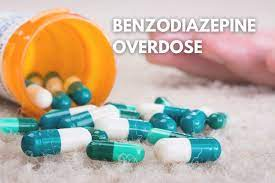Benzodiazepine Abuse Symptoms & Withdrawal
Immediate
Placement Available at our Top-Rated Treatment Centers.
Please call us at (855) 410-4488. We work
with most major insurance providers and offer flexible payment
options!
Atrium Addiction Care offers a variety of treatment choices and programs for individuals struggling with drug or alcohol addiction. Our inpatient treatment programs are designed for those who have more severe substance use problems and require 24-hour care. We admit both voluntary and involuntary patients.

Benzodiazepines (benzos) are a class of prescription drugs commonly used to treat anxiety, insomnia, and seizures. While these medications can be highly effective in the short-term treatment of certain conditions, they also have a high potential for abuse and addiction.
Benzodiazepine abuse is characterized by continued use despite negative consequences, such as job loss or health problems, while benzodiazepine addiction involves physical dependence on the drug.
Withdrawal from benzodiazepines can be difficult and potentially dangerous without proper medical supervision. Symptoms of withdrawal may include tremors, sweating, anxiety, hallucinations, and seizures.
In this article, we will discuss the symptoms of benzodiazepine abuse and addiction as well as strategies for safely managing withdrawal through professional care at Atrium Addiction Care. By understanding the risks associated with benzodiazepine misuse and seeking appropriate help when needed, individuals struggling with substance abuse can improve their chances for successful recovery.
What Are Benzodiazepines?
Benzodiazepines are a class of psychoactive drugs that affect the central nervous system. They are the most commonly prescribed medications used for various conditions, such as anxiety disorders and insomnia.
Benzodiazepine types include Alprazolam (Xanax), Diazepam (Valium), Lorazepam (Ativan), and Clonazepam (Klonopin). These drugs work by enhancing the effects of gamma-aminobutyric acid (GABA) in the brain, which has a calming and sedative effect on the body.
While benzodiazepines have legitimate medical uses, they can also be highly addictive when misused or abused. Addiction causes may vary from person to person but often involve seeking relief from stress or emotional pain.
People who abuse benzodiazepines may take higher doses than prescribed, use them more frequently or combine them with other substances like alcohol or opioids. Street names for these drugs include “benzos,” “downers,” and “tranqs.”
Alternative treatments for conditions that require benzodiazepines exist but must be discussed with a healthcare provider before making any changes to medication regimens. Non-pharmacological interventions such as cognitive-behavioral therapy (CBT), relaxation techniques, and exercise programs may help alleviate symptoms associated with anxiety and sleep disorders without exposing individuals to risks associated other medications with addiction potential of benzodiazepines.
Signs Of Benzodiazepine Abuse
The signs of benzodiazepine abuse can be quite subtle, but they may become more obvious as time goes on. Behavioral changes are often the first indication that someone is abusing these drugs. For example, a person who was once outgoing and social may begin to isolate themselves from friends and family members. They may also start neglecting their responsibilities at work or home.
Physical symptoms of benzodiazepine abuse can include drowsiness, slurred speech, impaired coordination, and slowed reaction times. These effects are similar to those caused by alcohol consumption. In extreme cases, an individual may experience respiratory depression or coma.
Psychological effects such as mood swings, anxiety, irritability, and confusion are also common among people who misuse benzodiazepines. Benzodiazepine abuse can have significant social impacts on individuals and communities alike. It can lead to strained relationships with loved ones and coworkers due to erratic behavior or decreased productivity.
Risk factors for developing addiction to benzodiazepines include having a history of substance abuse or mental health disorders. Additionally, long-term use of these drugs increases tolerance levels which ultimately leads to higher doses other dangerous drugs being taken which puts users at greater risk for overdose.
It's essential to seek help if you suspect yourself or someone close to you has developed an addiction to benzodiazepines. Early detection allows for prompt intervention before lasting damage occurs; however, it's never too late to seek treatment regardless of how severe the addiction is!
Effects Of Long-Term Use

In light of the symptoms of benzodiazepine abuse, it is crucial to also examine the long-term effects of such drug use. Chronic benzodiazepine consumption can result in a range of physical health problems following symptoms that may persist even after discontinuing usage. These include muscle weakness, coordination difficulties, and respiratory issues.
Another area impacted by prolonged benzodiazepine use is cognitive functioning. Studies have shown that individuals who take these drugs for an extended period often experience memory loss and difficulty with concentration. Additionally, their reaction times tend to be slower than those who do not consume benzodiazepines regularly.
The consequences of long-term benzodiazepine use extend beyond just one's physical and cognitive well-being; they can also affect emotional stability and social relationships. Users are at risk of developing depression or anxiety disorders as a result of relying on these substances to manage stress levels or cope with negative emotions. Furthermore, addiction may lead to isolation from loved ones and strain interpersonal connections due to erratic behavior associated with severe withdrawal symptoms.
Symptoms Of Withdrawal
Common Withdrawal Symptoms
The symptoms of benzodiazepine withdrawal vary from person to person, depending on factors such as the length and severity of use and individual physiology. However, some common symptoms include:
- Insomnia
- Anxiety
- Irritability
- Sweating
- Tremors
- Nausea and vomiting
- Muscle pain and stiffness
- Palpitations or rapid heartbeat
- Hallucinations (visual or auditory)
- Seizures (in severe cases) and more.
Coping Strategies
Withdrawal can be challenging for those who have become dependent on benzodiazepines. Coping strategies that may help alleviate or experience withdrawal symptoms may include:
- Deep breathing exercises
- Progressive muscle relaxation techniques
- Meditation or yoga practice
- Engaging in physical activity such as walking or swimming
- Talking to a trusted friend about what you are going through
Timeline of Withdrawal
The timeline of benzodiazepine withdrawal varies between individuals but generally lasts for several weeks to months. The first week is typically characterized by acute withdrawal symptoms such as rebound anxiety and sleep disturbance. By the second week these withdrawal symptoms start to begin to subside somewhat but other longer-lasting effects like mood swings or depression may occur. It can take several months before an individual feels back to their baseline level of functioning after discontinuing benzodiazepines.
Additional Tips for Coping with Withdrawal
- Feeling overwhelmed with emotions during withdrawal is normal.
- Seeking support from loved ones can ease distress significantly.
- Staying hydrated by drinking plenty of fluids will help minimize dehydration caused by excessive sweating.
- Eating nutritious meals regularly even when appetite is low aids overall health recovery.
- Getting enough restful sleep supports physiological healing processes.
Medical Detoxification and Long Term Recovery
Medical detoxification under supervision provides a safe environment where patients can receive symptom management medication if necessary while undergoing withdrawal. This helps prevent potential complications such as seizures which require emergency medical attention. After completing medical detoxification treatment it's important to note that long-term recovery requires ongoing support systems like therapy, medication management and group support. It's important to have a committed healthcare team that understands the complexities of benzodiazepine addiction and withdrawal for optimal outcomes.
Benzodiazepine Addiction Treatment
Benzodiazepine addiction can have a severe impact on an individual's physical and mental health, as well as their personal and professional lives. When seeking treatment for benzodiazepine addiction, it is essential to consider the various options available to ensure that individuals receive comprehensive care.
One effective approach to treating benzodiazepine addiction is through a holistic approach. This type of treatment focuses on healing the whole person, including their mind, body, and spirit. Holistic therapies may include yoga, meditation, acupuncture, and massage therapy. These alternative methods can help individuals reduce stress levels and promote relaxation while learning new coping skills.
Residential treatment programs are another option for those struggling with benzodiazepine addiction. In these facilities, clients live at the center full-time during their recovery process. Residential programs provide a safe environment away from triggers and temptations that could lead to relapse.
Clients participate in individual and group counseling sessions focused on cognitive therapy techniques to identify negative thought patterns related to substance abuse. Medication management is also provided in residential settings when necessary for withdrawal symptoms or co-occurring mental disorders such as anxiety or depression.
Aftercare support is crucial after completing any form of treatment program. It helps individuals maintain sobriety by providing them with ongoing guidance and resources for long-term recovery success. Aftercare support may include outpatient counseling sessions or participation in 12-step groups like Alcoholics Anonymous (AA) or Narcotics Anonymous (NA).
Continuing care plans should be tailored specifically to each individual’s needs based on factors such as length of use, severity of addiction, overall health status, family history of addiction/alcoholism among others.
Overall, there are multiple approaches available for treating benzodiazepine addiction effectively. A combination of different strategies often works best for most people battling this condition since everyone has unique experiences with drug abuse & trauma histories contributing towards why they developed benzo dependence in the first place. It is crucial to seek out a facility that can provide comprehensive, customized care and support for long-term recovery success.
Atrium Addiction Care Services - drug abuse

Addiction treatment is a crucial element in the management of benzodiazepine abuse and withdrawal symptoms. Atrium Addiction Care Services offers comprehensive addiction treatment programs that cater to individuals seeking recovery from benzodiazepine abuse. Our evidence-based approach involves an amalgamation of pharmacological interventions, behavioral therapies, and psychotherapy sessions.
Recovery support services are also available at Atrium Addiction Care Services. We recognize that addiction recovery is a process that requires ongoing maintenance and support. As such, we provide aftercare services such as group therapy sessions, individual counseling, and relapse prevention strategies to ensure our clients maintain sobriety even after leaving our facility.
At Atrium Addiction Care Services, we understand the interconnectedness between mental health and substance use disorders. We offer holistic care approaches that address both conditions simultaneously. Our team comprises licensed psychiatrists who work together with other professionals to develop personalized treatment plans for each client based on their unique needs and circumstances.
Finding A Path To Recovery - substance abuse
Seeking Treatment for benzodiazepine abuse can be a difficult process, however there are multiple resources available to assist an individual in finding the best possible care. Atrium Addiction Care provides a comprehensive range of evidence-based therapies and treatments to address benzodiazepine abuse and its symptoms.
Coping strategies may include relaxation techniques, cognitive behavioral therapy, and support groups to assist individuals in managing their withdrawal symptoms. Seeking professional help is often the best option to ensure a successful recovery from benzodiazepine abuse.
Seeking Treatment - benzodiazepine withdrawal

Benzodiazepine abuse can be a challenging condition to overcome, but seeking treatment is the first step towards recovery. There are several benefits of treatment that individuals struggling with benzodiazepine dependence or addiction may experience.
Treatment programs offer support and guidance from trained professionals who understand the complexity of this disorder. These professionals provide effective therapies that help patients address the root causes of their addiction.
Support groups are another option for those seeking treatment for benzodiazepine abuse. Support groups bring together individuals who share similar experiences, creating an environment where they can feel understood and supported. These groups offer a sense of community, which helps break down feelings of isolation and loneliness often experienced by people with substance use disorders.
Additionally, being part of a support group provides opportunities to learn coping skills from others in recovery. Medication-assisted treatment (MAT) is also available for individuals struggling with benzodiazepine addiction. MAT combines medication prescribed by a healthcare provider with behavioral therapy to treat substance use disorders effectively.
Medications used during MAT include methadone, buprenorphine, and naltrexone - all of these medications have been shown to significantly reduce cravings and withdrawal symptoms associated with benzodiazepine addiction. Relapse prevention strategies are taught through therapy options like cognitive-behavioral therapy (CBT), dialectical behavior therapy (DBT), motivational interviewing (MI), or contingency management (CM).
By using these approaches as well as other supportive treatments, individuals struggling with benzodiazepine abuse can find hope on their path to recovery without fear or shame about relapsing.
Coping Strategies - withdrawal symptoms

In addition to seeking professional treatment, individuals struggling with benzodiazepine abuse can benefit from coping strategies that promote overall wellness and emotional stability. Relaxation techniques such as deep breathing exercises, progressive muscle relaxation, and guided imagery can help reduce feelings of anxiety and stress. Mindfulness exercises like meditation and yoga also provide effective ways to manage emotions while improving mental clarity.
Support groups play a vital role in helping individuals maintain sobriety by providing ongoing support and encouragement during recovery. By connecting with others who understand the challenges of addiction, individuals can build a sense of community that fosters healing and growth. Healthy habits like eating well-balanced meals, getting enough sleep, and exercising regularly can also contribute to better physical health and improved mood.
Self-care practices are essential for maintaining good mental health while recovering from substance use disorders. Engaging in activities that bring joy or fulfillment, such as hobbies or creative pursuits, can help individuals cultivate positive emotions and build self-esteem. Seeking therapy or counseling services can also be beneficial in addressing underlying issues that contribute to addiction while promoting personal growth and resilience.
Conclusion
Benzodiazepines, commonly used to treat anxiety and insomnia, can lead to addiction when abused. Signs of abuse include increased tolerance and withdrawal symptoms. Long-term use can cause physical dependence and cognitive impairment. Withdrawal from prescribed benzodiazepines alone can result in severe symptoms such as seizures and psychosis.
Treatment for benzodiazepine addiction typically involves a gradual tapering off of the medication under medical supervision, along with therapy and support from addiction specialists.
Atrium Addiction Care offers comprehensive services including detoxification, residential treatment programs, outpatient care, aftercare planning, and more.
Recovery from benzodiazepine addiction is possible with professional help and support. By seeking out specialized treatment options like those offered by Atrium Addiction Care, individuals struggling with this type of addiction can find hope for a lasting recovery and improved quality of life.
